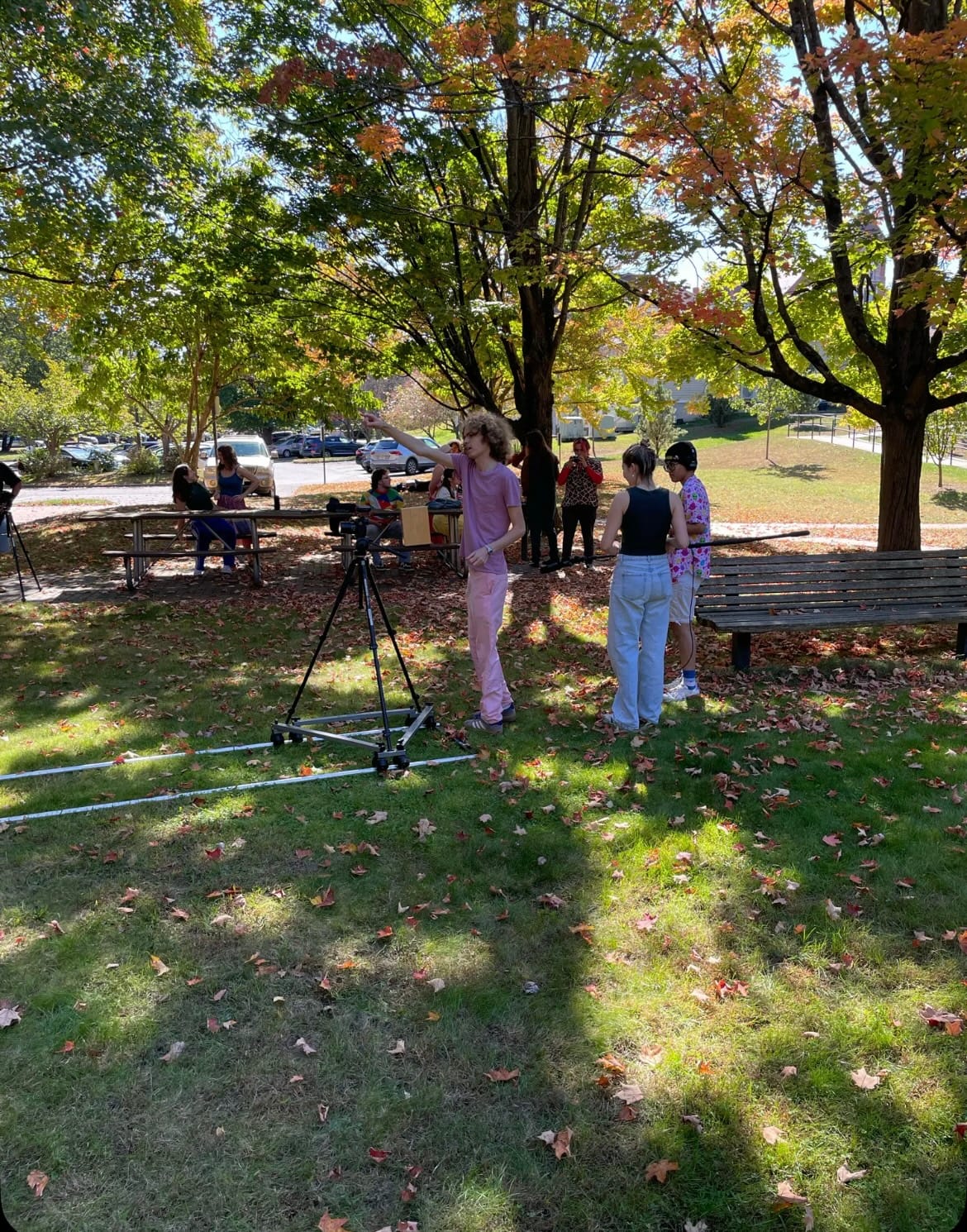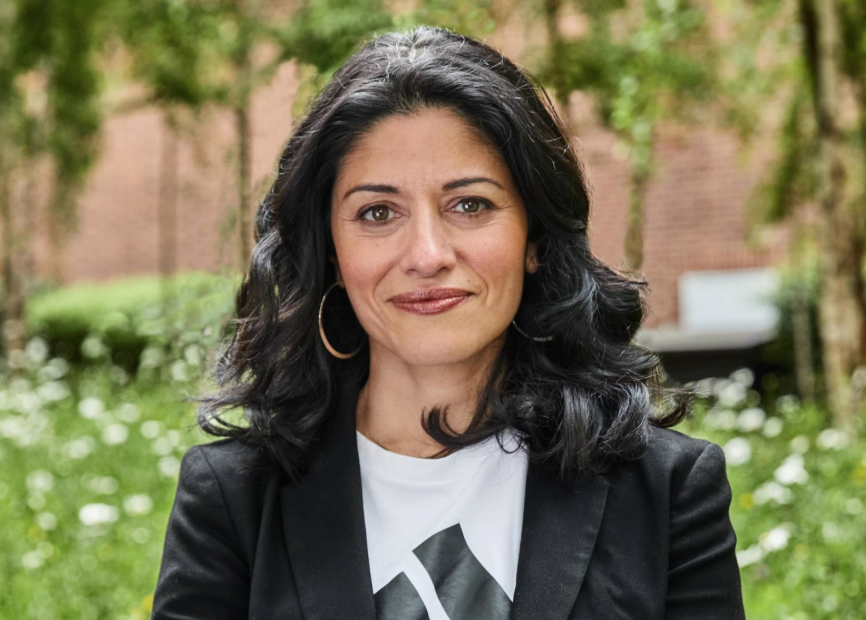Caden Stockwell: Pure Passion and Open Optimism
Caden Stockwell channels his bold creative vision into his films and political voice, leaving an unforgettable mark on Amherst through art and leadership.

I was first introduced to Caden Stockwell ’25 before I had even applied to Amherst. All visitors had a choice between three tour guides and when he introduced himself, I was struck by his enthusiasm for film and politics, as well as his dedication to extracurriculars. More importantly, I wondered when did he find the time to do everything? His big curly hair and vibrant monochrome outfits make him stand out from the crowd. Perhaps you’ve seen Stockwell carrying a camera on his way to direct scenes for an upcoming project, or maybe you’ve heard his voice leading the front lines of a protest. In any case, Stockwell’s undeniable presence on campus has positively impacted various aspects of Amherst’s community. His unapologetic individuality can be seen in all his endeavours. “I want to show people things that they haven’t seen before, and be original and memorable,” Stockwell said.
“He makes life his own,” close friend and collaborator Gabriel Proia ’25 remarked. “He’s really good at making what he wants and doing what he cares about, and not being bogged down with what people think. It’s really inspiring.”
California Dreamin’
Stockwell’s love for political activism stemmed from his parents. Instead of playing the Hot 100 radio in the car, they blasted NPR podcasts. Stockwell was invited to talk politics at the dinner table from an early age, and he joined the Democrats Club in high school. He credits his parents as the reason he became a political science major.
In high school, Stockwell was confronted with the age-old question: sports or theater? He ran cross country, but also acted in many school productions. In the end, he decided to quit cross country and go with his passion for theater.
His passion for film came later in life. The Covid quarantine primarily affected his senior year of high school, and allowed him to develop his passions outside of a school environment. He established his personal taste: “I just had so much free time that I was just watching tons of movies and finding cool music.”
Growing up in the suburbs of Los Angeles, Stockwell dreamed of leaving California and going to the East Coast as soon as he could. “Basically every single school I applied to was on the East Coast, and I’ve just grown to love it so much,” he said. At Amherst, he was particularly excited to have freedom in his classes through the open curriculum.
Involvement on Campus
Entering freshman year, Stockwell was excited to meet like-minded artistic and creative people. But, the adjustment to college was a bit of a shock for Stockwell, and he ended up spending the majority of his time “getting acclimated to the Amherst environment and living on my own,” he said.
Stockwell spent his summer after freshman year in Paris, through the Schupf fellowship, taking a Super 8 filmmaking course from Hampshire College. “We did this course in France for four weeks, and then we stayed an extra week in Paris to make the second film that we were doing for the Schupf fellowship,” he reminisced. While it was a valuable experience in production, he also realized that he didn’t want to commit to a whole semester abroad because he would miss the Amherst community.
During his sophomore year, Stockwell co-directed his first feature film, “Phases of a Daydream.” The fantasy-drama follows a recent college graduate who finds herself in a strange and whimsical world as she learns to confront her grief and adjust to a new life. Proia, who composed the film’s score, described working with Stockwell as initially challenging. In the past, Proia had a more traditional composition style, but Stockwell pushed him out of his comfort zone, “expecting something a little bit more avant-garde.”
They worked closely together on what they imagined for a scene. Proia would send Stockwell drafts, and Stockwell would give detailed feedback. In the end, Proia loved the final edition and realized that Stockwell widened Proia’s perception of what “good art” can look like. For Proia, Stockwell “opened [his] eyes to just enjoying what’s in front of [him] and being critical, but not critical to the extent that it destroys my experience.”
Initially, Stockwell came to Amherst expecting to be a political science major, with film as a side hobby. He didn’t see film and media studies (FAMS) as a “legit” major. However, as he took more and more classes in the department, he realized that filmmaking could be an actual career.
Stockwell applauds the FAMS department for allowing its students the freedom to explore film in an unstructured manner. His advisor, Associate Professor of Art and FAMS Adam Levine, and other professors in the department have been “so good at just really supporting you and letting you pursue your own passions and your own interests.” One class in particular that Stockwell really cherished was “Ozu Crossing Borders,” taught by Professor of Asian Languages and Civilizations Timothy Van Compernolle. The class was a deep dive into the evolution of Yasujiro Ozu’s filmmaking style. “It [was] a class of six students and we would just have really, really in-depth discussions,” Stockwell said.
On campus, Stockwell is involved in many film-related activities. He founded the filmmaking club, Plato’s Cave, which aims to produce three short films a semester “because there [are] so [few] opportunities for filmmaking if you’re not in a production class.” He is currently the screening coordinator for the Film Society, which hosts weekly film screenings. He has also planned a trip to the New York Film Festival and trivia nights with the club. Stockwell has written multiple movie reviews for The Student in the recurring “Film Society x The Student” column. He has performed at Marsh Coffee Haus multiple times and he won second place twice in Amherst Got Talent for his performance of one-man comedic plays.
Many students recognize Stockwell as a tour guide, but few people know that he has been the minute taker for the Association of Amherst Students’ meetings since his freshman year. Stockwell is also a magician. He started by watching YouTube videos and committing himself to learning card tricks for months. “I have this idea that’s not true and kind of narcissistic, but it’s very deeply embroiled in me, which is that if I just dedicate myself to something, I can do literally anything,” he said.
Stockwell’s political activism on campus ranges from involvement with Amherst for Palestine to the Labor Alliance to the Environmental Justice Alliance. For all of these groups he has led protests with a booming voice that he claims is “very good for leading chants.” Stockwell has also written two opinion pieces for The Student about the discourse surrounding Palestine. He feels disappointed that the Amherst community is not more politically active, and feels a responsibility to speak up and organize because “if you won’t do it, nobody else will.”
“In all of my experiences with organizing, it’s always been like three people doing everything,” he said.

The Final Act
Perhaps the culmination of Stockwell’s Amherst experience is his second feature-length film, the musical “It All Began with a Melody,” with music and lyrics by Phoebe Neilsen ’25. The musical takes place over one fall day in Massachusetts and follows a pair of long lost lovers on the brink of reconnection. Stockwell and Neilsen began developing this idea in March of 2024. Unfortunately, in the fall, the FAMS department rejected the project as a thesis due to the lack of a critical component. However, Stockwell continued working on it for fun; he didn’t care that he wouldn’t be receiving credit for it. As Neilsen puts it, “Caden is perseverant, remarkably so.”
In general, Stockwell’s favorite type of assignment is a large-scale project that requires months of planning. This endeavor, “It All Began with a Melody,” was no different. Simply scheduling 25 college students to be available at the same time to film musical numbers was a mammoth task in and of itself. “It’s like I’m Sisyphus pushing a boulder,” Stockwell joked. But Neilsen hails his executive functioning: “He is able to schedule things immediately and get things tied down. They’re so good at time management.”
When he finally screened the movie to audiences last month, all the work felt like it was worth it. “I feel like the experience of finishing a project or performing something is just the best high that you can possibly get.” This feeling is what pushes Stockwell to continue creating. Even while just watching a movie (and he has watched 146 so far this year), all Stockwell can think about is how much he would like to create something as interesting and inspiring as the films he’s watching.
Through his art, Stockwell aspires to invoke emotion in his audience. “That’s what art’s all about,” he said, whether that’s laughter, tears, or shock. He also desires to be creative, earnest, and express himself in everything he creates. Vibrant color schemes and magical realism characterize his films. When asked to explain this choice, Stockwell said that “a lot of those things are just things that I kind of started to do, and then I just liked it. So I just kept on with it.” Color symbolism is one of Stockwell’s favorite aspects of films, particularly in his most cherished movie, “The Young Girls of Rochefort.” He also believes that magical realism makes a story more compelling and surreal, two attributes that he aims for.
Stockwell truly believes the idea that “better things are always possible and the way that things are now is not how it has to be.” This statement motivates both Stockwell’s political activism and his art’s optimistic nature. He cherishes that he can just stop and learn something new at any moment. This allows him to always strive to be a better artist. Neilsen said that Stockwell “is a true showman. He knows how to work an audience and has a great sense of making things into these energetic productions.”
To any incoming freshman or potential FAMS majors, Stockwell recommends that you “just do things and try things” and take advantage of all the opportunities that Amherst has to offer. He said that, particularly for filmmaking, he is able to check out all of the necessary equipment for free. He got students interested in theater to volunteer to act in his films for free. There are many fellowships available that can provide funding for costuming and props. Outside of Amherst, a film like “It All Began with a Melody” could have cost up to $100,000, but Stockwell didn’t spend a cent of his own money. Most importantly, he reminds us to explore and experiment because, even if the result is terrible, there are very few consequences here: “Nobody gets hurt.” Neilsen testified that Stockwell taught them “to believe that if I can’t find avenues to make the kind of art that I want to make, I can make them happen for myself.”
What Comes After the Credits
Stockwell will teach video production this upcoming summer at Deerfield Academy’s art summer camp in Deerfield, Massachusetts. Post-summer, Stockwell plans to lead novelty ghost tours in Salem, Massachusetts. He considered attempting to break into the Hollywood film industry, but decided he would prefer not to “sell his soul.” Instead, he’d rather make indie films he can be proud of, like a “poker movie” or a “first person POV, but it’s from the perspective of a cat wandering around.”
As Proia reflected, “he has so much love in his heart, and he’s just able to see the beauty in everything. And I think his art shows that, and his love of art shows that he’s willing to experience all the ups and downs of life and then express that in beautiful ways.”
Stockwell’s not yet ready to leave Amherst, but whether he’s leading unconventional tours, directing his own independent film, or living in a big house with eight cats, I know that he’ll put his all into any pursuit and leave his community better than he found it.






Comments ()